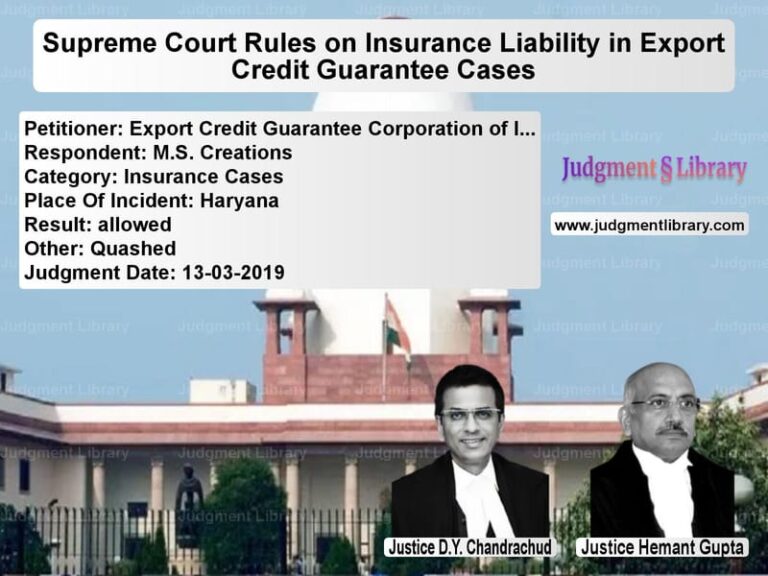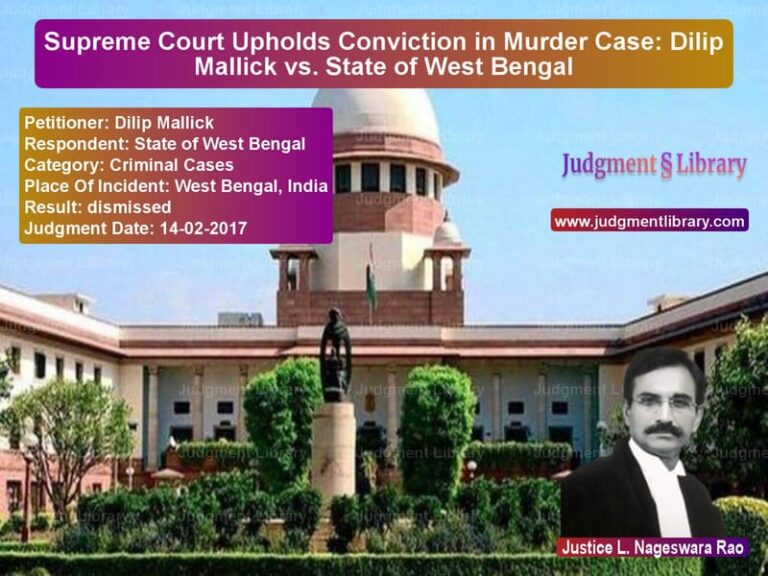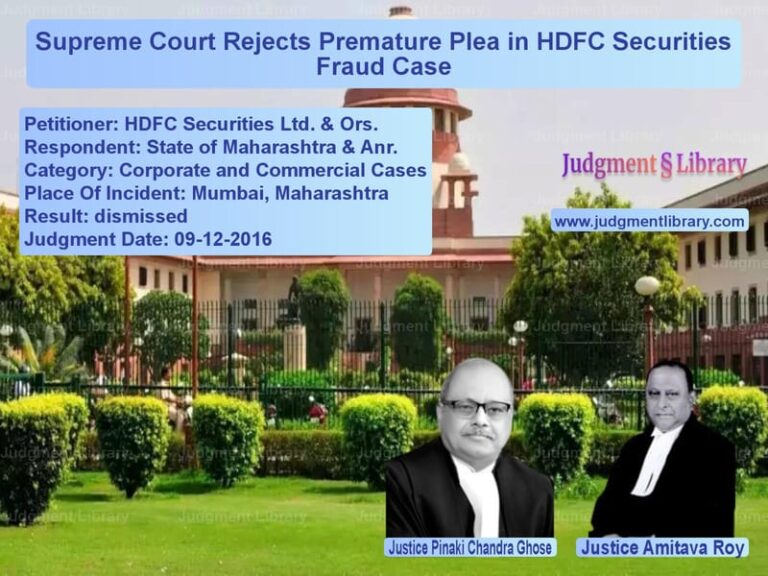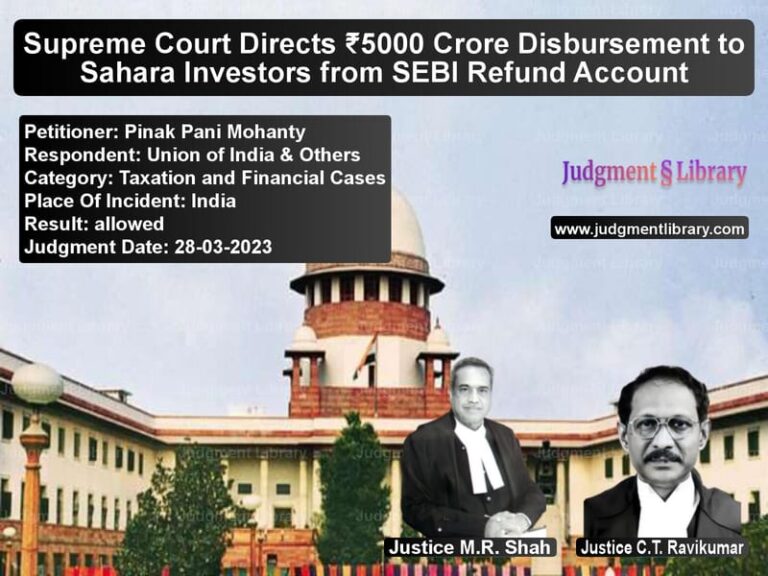Supreme Court Orders Fresh Hearing in Bihar Land Compensation Dispute
The Supreme Court of India, in the case of Dharnidhar Mishra (D) & Anr. vs. State of Bihar & Others, addressed a long-pending land acquisition dispute in which the appellant had not received compensation for over four decades. The case highlights the legal principles governing land acquisition, the rights of property owners, and the obligations of the State in ensuring timely and fair compensation.
Background of the Case
The case arose from a land acquisition notification issued in 1976 under Section 4 of the Land Acquisition Act for the construction of a state highway in Bihar. The land belonging to the appellant, Dharnidhar Mishra, was taken over by the State in 1977. However, despite repeated requests, no compensation was paid to him.
The appellant continuously pursued the matter with the authorities, but no award was passed for his compensation. After years of unsuccessful attempts, he approached the Patna High Court, filing a writ petition seeking redress. The High Court dismissed the petition in 2019 on the grounds of excessive delay, stating that the claim was filed 42 years after the acquisition.
Unhappy with this decision, the appellant filed a Letters Patent Appeal before a Division Bench of the High Court. The Division Bench directed him to file an application before the concerned authority for the disbursement of Rs 4,68,099, which the State had assessed as compensation. Dissatisfied with the limited relief, the appellant then appealed to the Supreme Court.
Key Legal Issues Considered
- Whether the High Court erred in dismissing the writ petition solely based on delay.
- Whether the State had an obligation to pass an award and determine compensation at the time of acquisition.
- Whether the assessed compensation amount of Rs 4,68,099 was just and fair.
- Whether the doctrine of laches (delay in filing a legal claim) applied in this case.
Arguments by the Petitioner
The petitioner’s counsel contended:
- The State took possession of the land without awarding any compensation, violating constitutional rights.
- The delay in filing the writ petition was due to the prolonged inaction of the State and not due to any negligence by the petitioner.
- The right to property was a fundamental right under Article 31 of the Constitution at the time of acquisition, and it continues to be a constitutional right under Article 300-A.
- The High Court erred by dismissing the petition on the grounds of delay without considering that the cause of action was continuous.
Arguments by the Respondent (State of Bihar)
The State argued:
- The appellant should have actively pursued his claim for compensation soon after the acquisition.
- The State had assessed the compensation at Rs 4,68,099, which was to be disbursed upon submission of a proper application.
- The High Court had correctly directed the petitioner to follow due process by applying to the concerned authority.
- The writ petition was rightly dismissed due to an unreasonable delay of over 42 years.
Supreme Court’s Findings
The Supreme Court analyzed the case based on constitutional and legal principles governing land acquisition and compensation.
1. Right to Property as a Constitutional Right
The Court reaffirmed that the right to property, though no longer a fundamental right, is protected under Article 300-A of the Constitution. It cited previous rulings, including:
- Hindustan Petroleum Corporation Ltd. vs. Darius Shapur Chenai (2005) – Holding that property cannot be taken without due compensation.
- N. Padmamma vs. S. Ramakrishna Reddy (2008) – Emphasizing that property rights cannot be arbitrarily taken away.
- Tukaram Kana Joshi vs. MIDC (2013) – Stating that State authorities must ensure compensation in cases of land acquisition.
2. Delay in Seeking Compensation
The Court held that delay alone cannot justify dismissing a claim for compensation, especially when the delay was caused by the State’s failure to act. It referred to:
- Vidya Devi vs. State of Himachal Pradesh (2020) – Recognizing that delay cannot be used as a defense in cases of wrongful deprivation of property.
- State of Haryana vs. Mukesh Kumar (2011) – Affirming that property rights are also human rights.
3. Non-Speaking Order by the High Court
The Supreme Court criticized the High Court for failing to provide a reasoned order. It noted that:
- The basis for assessing the compensation at Rs 4,68,099 was unclear.
- The High Court did not ask why the State failed to determine compensation in 1977 itself.
- The appellant was not given an opportunity to challenge the compensation amount.
Final Ruling
The Supreme Court set aside the High Court’s order and remitted the case for fresh consideration, directing:
- The High Court must re-evaluate the compensation amount and ensure due process is followed.
- The State must justify how the compensation was calculated.
- The matter must be decided within two months.
Implications of the Judgment
- Strengthening Landowner Rights: Reinforces that delay cannot be used as an excuse to deny rightful compensation.
- State Accountability: Ensures that authorities do not arbitrarily delay land acquisition proceedings.
- Judicial Oversight: Directs courts to ensure reasoned decisions when dealing with land acquisition disputes.
Conclusion
The Supreme Court’s ruling highlights the fundamental principle that property cannot be taken without just compensation. The judgment serves as a strong reminder to State authorities about their obligations and reinforces the judiciary’s role in protecting constitutional rights.
Petitioner Name: Dharnidhar Mishra (D) & Anr..Respondent Name: State of Bihar & Others.Judgment By: Justice J.B. Pardiwala, Justice Manoj Misra.Place Of Incident: Bihar.Judgment Date: 13-05-2024.
Don’t miss out on the full details! Download the complete judgment in PDF format below and gain valuable insights instantly!
Download Judgment: dharnidhar-mishra-(d-vs-state-of-bihar-&-oth-supreme-court-of-india-judgment-dated-13-05-2024.pdf
Directly Download Judgment: Directly download this Judgment
See all petitions in Property Disputes
See all petitions in Damages and Compensation
See all petitions in Landlord-Tenant Disputes
See all petitions in Judgment by J.B. Pardiwala
See all petitions in Judgment by Manoj Misra
See all petitions in allowed
See all petitions in Remanded
See all petitions in supreme court of India judgments May 2024
See all petitions in 2024 judgments
See all posts in Civil Cases Category
See all allowed petitions in Civil Cases Category
See all Dismissed petitions in Civil Cases Category
See all partially allowed petitions in Civil Cases Category







